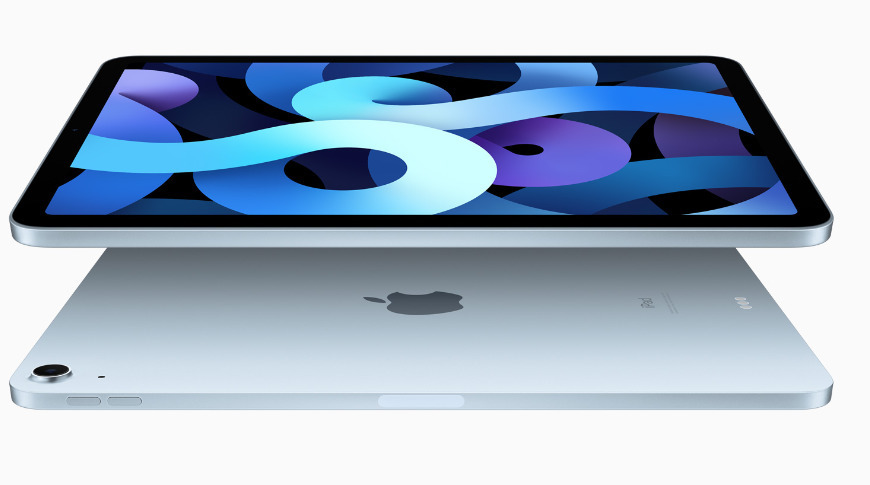Apple's domination of the global tablet market continued in the third quarter of 2020, according to market research firm Canalys, with iPad shipments seeing an estimated 47% year-over-year growth rate thanks to coronavirus trends.
According to Canalys, Apple shipped 15.2 million iPads in the September quarter, up from 10.4 million units in the year ago period. The performance was good enough to capture a 34.4% share of the global market.
Samsung saw a big jump in quarter three, moving an estimated 9 million tablets to take 20.4% of the market, up 79.8% year-over-year. Huawei placed third among the world's top-five vendors with 5.1 million tablets shipped for an 11.5% marketshare.
Amazon and Lenovo came in fourth and fifth, respectively, on shipments of 5 million and 4.2 million units. Amazon took an 11.3% share of the market, while Lenovo managed 9.1 percent.
Canalys' estimates see Apple leapfrog into second place among the world's PC vendors. The research firm now includes tablets in its PC market tabulations.
Apple's continued segment lead comes amid a worldwide pandemic that has forced many to work from home or participate in remote learning programs. The company in September launched a new iPad Air model that shares many similarities with the top-tier iPad Pro line, as well as a 10.2-inch entry level model.
In reporting earnings for its fourth fiscal quarter of 2020, Apple said iPad revenue exceeded internal expectations by notching $6.8 billion, up significantly from $4.66 billion last year.
 Mikey Campbell
Mikey Campbell








 Marko Zivkovic
Marko Zivkovic
 Amber Neely
Amber Neely
 Malcolm Owen
Malcolm Owen


 Christine McKee
Christine McKee




-m.jpg)






3 Comments
Everyone else has pretty much thrown the towel when it comes to tablets.
Same thing happened in MP3 players once Apple had iPods at every $50 increment from $50 to $500. Apple is trying to do that in phones, tablets and watches.
No, this isn't what happened at all. Instead:
A) Apple only sold 5 million more tablets than Samsung did
joefrank
B) Wrong. Apple's market share increased by a mere 1%. And for 2019, Apple's market share was 35%.
C) This writeup didn't mention it, where Apple sold 6.8 million macOS devices - MacBooks, Mac Minis, iMacs and Mac Pros - 9.4 million Chromebooks were sold. 2.5 million more ChromeOS devices were sold than macOS devices. Also, while 9.4 million Chromebooks sold just last quarter, 17 million Chromebooks sold all of last year.
D) Those were just schools and consumers looking for the cheapest devices possible? Nope. Behind education, the 2nd biggest market for Chromebooks was small and medium sized businesses. So between Google Classroom and GSuite - schools are workplaces after all - ChromeOS is a legit enterprise platform now. And to think that it went from absolutely nothing to its current position in less than 10 years. Focusing on cheap devices that could be easily managed from the cloud to get into schools was their smartest move, but putting back enough of the Gentoo kernel that they stripped out to support containers for Android and Linux apps in order to drive consumer and enterprise adoption was the second smartest. Their recent move was to restore the hypervisor code in order to enable Windows application support via Parallels, which will drive even more growth - though on Intel and AMD Chromebooks and not ARM ones.
E) For all the hype about Apple moving to ARM, Lenovo had 351% growth - selling 3.5 times more Chromebooks this year than last - thanks to the #1 ChromeOS device this year, the ARM-powered Lenovo Duet.
F) Paging Daniel Eran Dilger! For years he claimed that the media and the analysts were conspiring against poor Apple by refusing to count iPads as computers. That if they did, Apple would be the #1 computer seller by far! This was always problematic - if iPads could be counted as computers then why not smartphones, especially phablets, and if this was done that would make Samsung the #1 seller of computers - but yeah, no. Lenovo - due to selling far more actual PCs than Apple does as well as having a growing Android tablet operation (they now rival Amazon) - is the actual #1 seller of computers even using DED's method of tilting the numbers.
So ... a good quarter for Apple. But a better quarter for others.